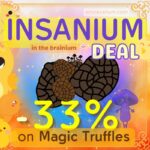Unlike THC, which is the active ingredient in marijuana, CBD won’t get you high. Like marijuana, CBD gives users a feeling of calm and “chillness” in oils and edibles. But unlike its cousin, CBD isn’t psychoactive.
However, despite its popularity as a “safe drug”, CBD might actually get you in trouble if you’re not careful.
Researchers at Harvard found out that patients who often use full-spectrum, hemp-derived products may have positive test results for THC in a urinary drug screen:
“It is often assumed individuals using hemp-derived products will test negative for THC. Current results indicate this may not be true… underscoring the potential for… loss of employment.”
This is bad news for frequent users who enjoy CBD precisely for its “harmless” reputation: “It’s not weed, so what’s the harm?”

Now, even they could get fired because of a positive drug test result — one that lumps CBD and THC together.
But why is that?
Trace Results of THC, Even Without Marijuana
In a clinical trial , 15 patients took 1 ml of CBD three times per day, for a daily dose of 30 mg of CBD. They were also given 1 mg of THC, which is present in most hemp-derived products.
Bear in mind that pure, 100% CBD – which users won’t find in retail hemp products — will not trigger a positive drug test result.
CBD also does not become THC after taking it, so the researchers had to mimic real-world scenarios, where CBD products retain tiny bits of THC.
Just recently, the US Navy revised their ban on CBD products to include topical products, like lotions and shampoos. Their reason? Using CBD products may expose service members to “trace levels of THC”.
Call it paranoia or whatever you like. But those military sailors might be onto something, as the study found out:
“After 4 weeks, 7 participants (50%) tested positive for THC-COOH, while 7 tested negative…The drug screen was often more sensitive than its stated lower limit of detection.”
The authors pointed out a lack of research on CBD:
“Few sources have directly assessed whether the use of high-CBD products could yield positive results on urinary drug tests [on] cannabis use through the detection of [THC].”
The study was done at McLean Hospital in Belmont, Massachusetts from June 2018 to February 2020.
Here’s the Thing About Hemp and CBD…
In the United States, the 2018 Farm Bill legalized hemp cultivation, and guided CBD production by licensed growers. This doesn’t exactly make CBD legal, but technically OK if the hemp it comes from is legally produced according to federal law.
Soon afterwards, several states passed their own laws which allowed hemp farming within their boundaries.
Rep. Morgan Griffith (R-VA), who co-sponsored a bill in September to allow the trade of hemp as a dietary supplement, said:
“Hemp was historically an important crop for Virginia farmers, and dietary supplements made from it do not possess dangerous addictive qualities.”
Even so, current laws in the US create confusion about hemp and CBD’s legal status. This remains the case despite recent wins for “hard” psychedelics.
CBD vs. Marijuana
When discussing CBD cannabis, marijuana, and hemp will, of course, always come up. You see, the plant Cannabis sativa has 2 main species: hemp and marijuana (or weed). Both have CBD, but there’s more of it in hemp, which also has very little THC compared to weed.

When adverts mention hemp oil, what they mean is the oil taken from the seeds of the hemp plant. There are zero cannabinoids (CBD nor THC) in hemp oil. And because it’s also chock full of healthy fats, hemp oil is often added to moisturisers.
The cannabis plant is composed of 2 active portions. Dr. Junella Chin, DO, a medical cannabis expert, explains:
“CBD is the non-psychoactive portion of the plant, so what that means is you won’t have any effects like euphoria. You won’t feel sedated or altered in any way.”
So, nope. Unlike weed, CBD won’t get you high. But urinary drug screen tests may make it seem the opposite, so be warned…
What Now?
Besides potentially losing your job due to trace THC particles, there is another reason to be careful with CBD. First, about 5% of those who take CBD experience side effects. They’re usually the ones who are allergic to Advil or Tylenol.
Also, because the FDA doesn’t regulate CBD, there’s always the risk that products contain trace amounts of THC. Unless you are buying from a company that can guarantee that their product is 100% CBD (check their certificates of authenticity).
At the end of the day, it’s your decision what to do with this news. For many people nothing will change, but we think it is always good to know of the grey areas when making these decisions.
As scientists begin to work isolating the different properties of psychedelics — such as magic mushrooms — perhaps in the future we will be pondering this question in relation to them. Will regulations change to encompass the use of these products? The trend for items containing substances that were once illegal shows no indication of stopping, and their proven benefits certainly justify further conversation into the matter.

What do you think?
Are you a CBD product user? Might this news affect your habits?

 INSANIUM Deal
INSANIUM Deal 

 Combo deals >
Combo deals > . It only took 7 days from Australia which is really impressive. I am deeply grateful and excited to experience my truffles now. Looking forward to my journey within xxx
. It only took 7 days from Australia which is really impressive. I am deeply grateful and excited to experience my truffles now. Looking forward to my journey within xxx
 Strength up to 110/100
Strength up to 110/100 
 %
%
 500 gr.
500 gr. 
